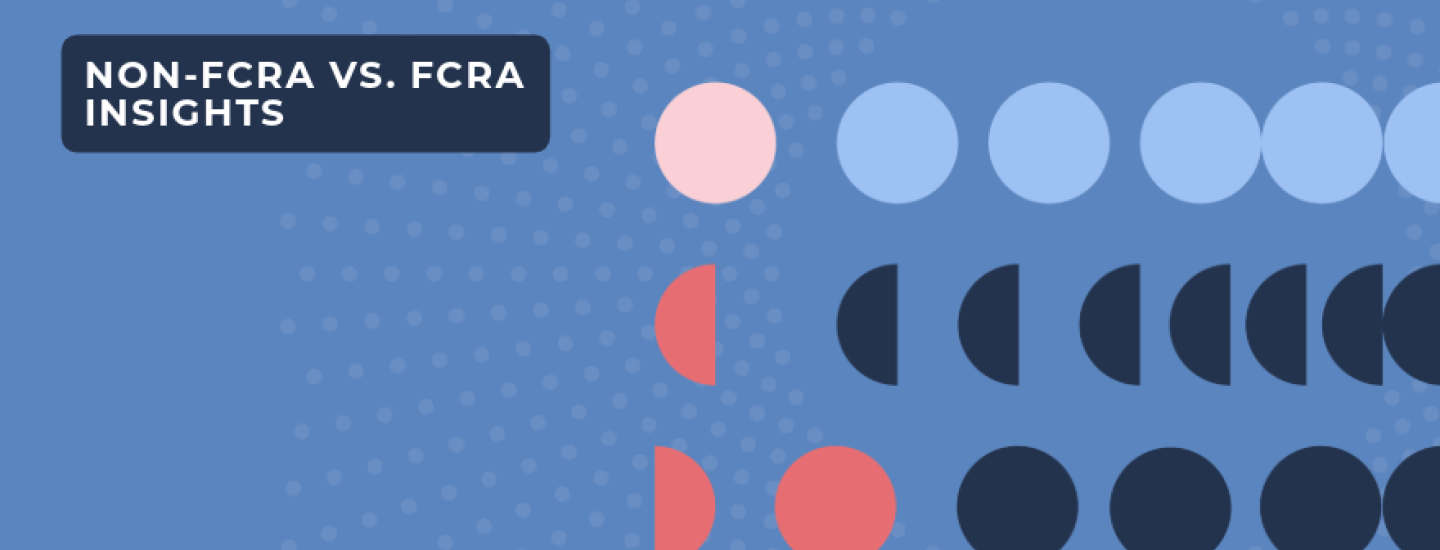This blog was originally published 5/22/2024 and has been updated
Consumer demand for fast and easy banking processes has never been higher. Whether customers are opening new accounts, making digital payments, or applying for credit, financial institutions (FIs) must be able to offer seamless customer experiences—while assessing the risk associated with those transactions.
Many FIs rely on tools that use consumer data to inform their risk assessments. And although such tools are valuable, they can add another layer of complexity.
Because when consumer data comes into play, FIs and companies need to make sure they're managing the data responsibly, in compliance with the Fair Credit Reporting Act (FCRA).
In some cases, however, an FCRA solution is not required.
If all this has you confused, you're not alone. Here we’ll explain three important things FIs should know about using consumer data in risk assessments:
- What is the meaning of FCRA and non-FCRA?
- When can FIs use non-FCRA risk assessment solutions—and what are the benefits of doing so?
- How to choose between an FCRA and non-FCRA solution?
What is the meaning of ‘FCRA’ and ‘non-FCRA’ solutions?
The FCRA governs information collected by consumer reporting agencies and limits who can access that information. It also places stringent requirements on furnishers and users of such information. FCRA-regulated data is primarily used in eligibility decisions related to credit or credit access, insurance and employment.
Non-FCRA solutions, on the other hand, use information that's not tied to an FCRA-eligibility determination. This information may include whether an account status is open or closed or whether an individual is the legitimate account .
For FIs, understanding the difference is crucial. Because when appropriate, institutions can use non-FCRA solutions that fall outside the stringent requirements set forth by the FCRA.
When can (and should) FIs use non-FCRA solutions?
When processing payments, sometimes, FIs simply want to know if the account being used is open and whether the person making the payment is authorized to transact on that account.
In such cases, the primary concern is not the consumer’s transaction history, or their eligibility to qualify for a product, but instead is the legitimacy of the accounts involved and whether they are open.
FIs may use non-FCRA solutions to confirm the account’s validity and whether it is open. These tools are especially useful in transactional contexts like payment processing, where the speed and efficiency of validation are critical.
Similarly, a treasury bank may offer non-FCRA solutions to corporate or government entity clients to verify the status of recipient accounts, for example those involved in insurance settlements, real estate transactions, or payment of government benefits.
By adopting non-FCRA tools, FIs can efficiently access the information needed to process a transaction and can reduce their regulatory burden—because FCRA mandates don’t apply.
What’s more, non-FCRA solutions can be simpler to implement FCRA compliant solutions.
How should FIs choose between FCRA and non-FCRA solutions?
Adopting non-FCRA solutions when appropriate can simplify and speed up transactions. However, these solutions should not replace comprehensive financial profiling or in-depth consumer reports when those are required.
To ensure compliance, FIs should develop clear policies and procedures that delineate when and how to use FCRA solutions and when to use non-FCRA solutions. Training staff on these procedures and regularly auditing data use can also help maintain adherence to regulatory requirements.
How can Early Warning help?
Early Warning offers both FRCA and non-FRCA solutions, and we can help FIs discern when each is most appropriate for your use case.
While our traditional payment service, Payment Chek®, aligns with FCRA guidelines, Deposit Chek® and Verify Account* offer streamlined alternatives. .
Deposit Chek® is our non-FCRA solution available to FIs. This service helps safeguard deposit channels. FIs can use it to prevent fraud loss, streamline transactions and make funds available sooner. For treasury banks looking to provide a non-FCRA solution to corporate and government entity clients, Verify Account delivers status information regarding whether the account is open and account owner authorization information without delving into details that would trigger FCRA considerations.
To learn more about our non-FCRA solutions, visit our website.
*AOA is not sold separately as a stand-alone service. It is available with all Payment Chek®, Deposit Chek® and Verify Account capabilities.
